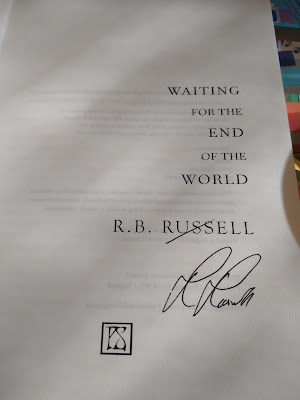"Above all, I can't believe that what I did so long ago has yet to catch up with me. What I have not told Lana is I live each day as though it is my last of freedom. When the post arrives, the telephone rings, or if there is a knock at the door, I am expecting the worst, even after ... I do the calculation ... eighteen years."
In what he describes as an "unusually fatalistic mood," he thinks about the "few words" of a phone message he'd heard after work and how because of it "the first stone has been loosened from the foundations of our house on Sapphire Street." Once home, and after a night of strange dreams, the next day Lana's off to her job and Elliot plays the remainder of the message, erasing it afterwards. It seems that a friend from his school days, Vince Reynolds, wants to talk to him about something that happened in their past. He continues to avoid Vince on the phone, but eventually speaks to him and learns that Vince is thinking of going to the police to confess and that he would like to get together to talk. Vince has found religion and wishes to "atone" for his "sin," to "face any punishment;" strangely though, his version of events of that day are quite different than Elliot's. Elliot, who now has had to tell Lana what it was all about, believes it's the beginning of the end of everything; he doesn't want Vince to do anything and travels to St. Michael's retreat where Vince and his fellow members of the Children of the Cross are now living, along with none other than a man whom the Children of the Cross believe is Jesus Christ, who has come again "to shepherd his flock." Elliot's aim: not to have Vince reconsider his plan, but to have him "change his mind and disappear from my life once again." What Elliot doesn't realize is that his visit to St. Michael's will change everything in ways he could not possibly expect.
While it may sound like the plot of a crime novel, Waiting for the End of the World is anything but. Shortly after the beginning of the present timeline, the story begins to move back and forth through time (and knowing what I know now I'm absolutely fighting with myself to not say anything more about that). At each move there are added elements of context, suspense and tension that kept me turning pages, yet, as I said in my initial thoughts at goodreads, while reading I kept wondering to myself what all of this was leading to. Let me just say that there came an OMG moment toward the end where I not only realized what was happening, but also when I realized that everything that had come before has suddenly taken on momentous significance.
Among other fascinating topics, within Waiting for the End of the World the reader will encounter themes of religious belief through history, cults and what it is about the need for a Messiah that drives people to gather around a particular individual to take them through an apocalypse, the importance of dreams and the idea that one particular event can unknowingly and unwittingly change the course of things. It's an amazing book, and the writing is utterly fantastic, drawing you in slowly until there comes that above-mentioned moment when everything just explodes. On top of everything else, I've also made note of all of the book titles that the author included in this one, and I was so pleased to see Machen's Hill of Dreams listed among them; I'm sure that its inclusion as well as that of Rolfe's Hadrian the Seventh (and others) were not simply random choices.
Very nicely done, and my advice for readers who at some point feel like you're wondering where this story is headed is to just be patient and enjoy the ride, but to be sure to pay attention along the way. In this book, things have a habit of turning up again when least expected. This one I can certainly and very highly recommend. Like all of my favorite books, I can honestly and without reservation say that I've never read anything quite like it.


